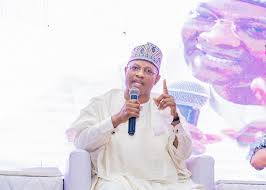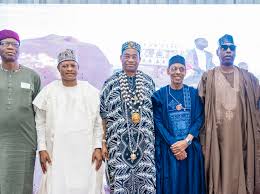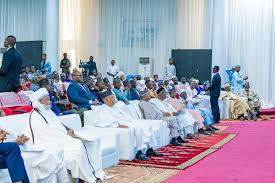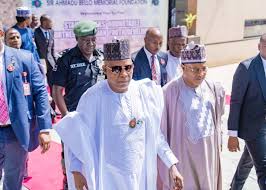It was a day for the physicians to heal themselves. It was a day to recall the good memories of Sir Ahmadu Bello. It was a day to think of a new Northern Nigeria built on the strength of its teeming youthful population.
Governor Uba Sani who argued that the North should blame itself for the region’s underdevelopment proposed a marshal plan going forward, that must involve all stakeholders, emphasising that “all Northerners who have held political positions from 1999 to date-at both federal and state levels-must be part of this northern rescue mission.”
He participated on Wednesday as a panelist at the Stakeholders’ Roundtable on Northern Nigeria Youth Development, which the Sir Ahmadu Bello Memorial Foundation organized. He stated, “Beyond the political class, the business community, traditional and religious institutions, and civil society must also be engaged in this initiative.
“In designing the marshal plan, security strategies, or frameworks, northern states, and stakeholders must strategically involve the youth. Their full participation will undoubtedly be a game-changer in addressing insecurity and overcoming developmental challenges,” he noted.
He urged Northern leaders and stakeholders to take responsibility and stop blaming other regions for the predicament of the region and challenged those who had held political positions in the past to give an account of their contributions to the development of the region.
He buttressed his submission with the hands-on experience from his State: “In Kaduna State, we are building three Vocational and Technological Skills Acquisition Cities to equip our youths with the requisite skills to enable them to take up jobs in industries and other businesses our administration has attracted to Kaduna State. The Skills Cities will graduate at least 12,000 youths annually.
“We are also remodelling the Panteka Market in Kaduna to become a major centre for skills acquisition, engaging over 38,000 artisans. We are carrying out comprehensive infrastructure upgrade at Panteka Market to make it an international centre for skills acquisition and job creation,” he further said.
He said, that before 2016 the North was largely peaceful, and that ‘’there were only occasional ethno-religious conflicts”. “People could travel freely around the North without fear of being attacked by criminal elements. Then came terrorism, banditry, kidnapping, and insurgency.
“We folded our arms and failed to address the underlying causes of these threats to our collective existence,’’ He pointed out that northerners have been holding key positions in successive administrations may have, “failed woefully to fashion and implement programmes to address the infrastructure gap, tackle poverty, and unify our people’.
He argued that the people’s patience is running out because “they are beginning to question our actions”. They are saying NO to our self-centred politics. They are demanding answers. And answers we must give them.’ “They want to know why the North is backward despite the humongous amount that sank into its development. They want to know why the Northern Elite who have for years been in control of the levers of power failed to develop the North”.
“They want to know why there are thriving Southern-owned industries and banks, while very few are owned by people from the North,’’ in his thought-provoking treatise at the event.
On his part, Governor Mohammed Zulum of Borno State called on the federal government to adopt policies that will restore the dignity, development, and prosperity of the Northern region.
Gov Zulum advised the Federal Executive Council and the National Assembly to review the tax reform bill to repeal clauses that may cause hardship to the people of the country.
Speaking at the stakeholders’ roundtable on Northern Youth Development organised by the Sir Ahmadu Bello Memorial Foundation President Tinubu, who was represented by Vice President Kashim Shettima, invoked the legacy of the late Sardauna of Sokoto and former Premier of Northern Nigeria.
A statement by the Senior Special Assistant to the President on Media and Communications in the Office of the Vice President, Stanley Nkwocha, said President Tinubu warned that “whatever disrupts the growth of one region sets back the entire nation”.
He added: “For far too long, we have been taunted as a nation with the most children out-of-school — a reality that should not elicit pride but provoke urgent action. These alarming statistics have turned the promise of our population into a challenge rather than the dividend it ought to be.”
President Tinubu re-echoed his administration’s pioneering youth development initiatives, including the 3 Million Technical Talent (3MTT) programme and the Presidential Initiative for Youth Enterprise Clusters as a demonstration of its commitment to youth empowerment and national development.
“Our creative and digital economy is another goldmine,” the President said, outlining many programmes, such as the Skill-Up Artisans Programme (SUPA), Nigerian Youth Academy (NIYA), and the National Youth Talent Export Programme (NATEP).
He listed other programmes including the Nigeria Education Loan Fund (NELFUND) for higher education access, Investment in Digital and Creative Enterprises (iDICE) for digital entrepreneurship, the Outsource to Nigeria Initiative (OTNI) for global market participation, Youth Enterprise Clusters for business development, and the Renewed Hope Housing Scheme to address accommodation needs.
He also announced plans for a National Youth Development Bank and a Youth Data Bank, describing them as crucial tools for “providing financial and informational support” to young Nigerians.
President Tinubu laid out his administration’s plan to further address the North’s security challenges, saying it had outlined measures “to restore stability to the North,” including “strengthening community policing, rehabilitating displaced persons, and addressing cross-border challenges like smuggling and insurgency”.
Challenging young Nigerians to take up the gauntlet of building a nation where they would prosper, the President said: “You are not just the future of this nation, you are its present. Your energy, ideas, and determination are already shaping our policies and programmes.”
President Tinubu said his administration planned “to unlock the potential of the Nigerian youth, ensuring that their dreams transform Nigeria into an enduring symbol of democracy, development, and progress”.
A former Niger State governor and Chairman of the foundation’s Board of Trustees (BoT), Dr. Mu’azu Babangida Aliyu, announced that the event marked the foundation’s 15th anniversary.
He said: “The youth are not just the leaders of tomorrow; they are the driving force of our present and our future. Addressing their concerns is paramount to the stability and progress of our society.”
Aliyu urged the government to take the recommendations from the discussions seriously for the progress and well-being of Northern Nigeria.
“We must approach these discussions with open minds and a collaborative spirit, recognising that the solutions we seek will require a collective effort,” he added.
The Sultan of Sokoto, His Eminence, Muhammad Sa’ad Abubakar II, harped on the critical role of youth education in national development. His words: “Our youths are the foundation of any development we envisage in our society. They are not just leaders of tomorrow but leaders of today.”
He highlighted the need for continuous dialogue with the youth and the essence of education to bequeath a good future to them: “Forums like this must be held continuously to dialogue with our youths across the northern states
“Education is the strongest legacy any leader can leave to society. Without education, you are a nobody. I believe in infrastructural development, like roads and bridges, but more money should be spent on educating our children. We must ensure that our children are educated. Education must be at the top of the priority of government.
“In Islam, if you don’t even know how to pray and how to worship Allah; if you are an illiterate person, you cannot worship Allah. That is why education is very important. That is why we need to dwell more on how we can ensure that our children are educated.”





More Stories
Reps Bow to Pressure, Withdraw Compulsory Voting Bill
Nigeria’s Governors: Halfway to Where? (2)
Nigeria’s Governors: Halfway to Where? (1)